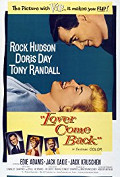
Directed by
Delbert Mann
107 minutes
Rated PG
Reviewed by
Bernard Hemingway

Lover Come Back
Sitting on the cusp between the sanitized ‘50s and the swingin’ ‘60s with the tectonic shift yet to come Lover Come Back is notable chiefly for its palpable obsession with sex.
Doris Day and Rock Hudson play Carol Templeton and Jerry Webster, account executives at rival Madison Avenue advertising agencies. She’s a buttoned-down workaholic from the sticks (Omaha, Nebraska, to be precise), he’s a playboy who schmoozes clients with a good time. He’s also best friends with his ineffectual boss, Pete (Tony Randall). When he wins a big account using what she considers unethical practices (booze and broads) she reports him to the Ad Council but he wheedles out of it by creating a fake ad campaign for VIP. Thanks to Pete the campaign is launched even though there is no such product. Carol gets wind that the account is up for grabs and tries to persuade the inventor Dr. Linus Tyler (Jack Kruschen) to let her agency handle it. Little does she know that the good doctor is actually Jerry.
Although the mistaken identity premise is one that was popular in the ‘30s, notably in the films of Astaire and Rogers, there is none of the breeziness here that made those films so enjoyable. In fact there is little romance (there is even a scene in which Day teaches Hudson to dance but it comes down to bumping groins) with Jerry more stimulated by the idea of possessing Carol sexually than in any way being taken by her personality. The film is quite remarkable for the doggedness with which he goes about his task with it only taking a sudden turn away just as he is about to realize his goal. Much of this is surprisingly amusing although with that turn the film descends into era-typical coyness.
What is even more surprising about the film is its preoccupation with sex – from the bunny-suited “dancers” that Jerry hires to beguile a prospective client, to Jerr ‘s accusation that Carol is more man than woman (and his decision to turn her into the former) to Carol’s pregnancy (Edie Adams also appears in the fake ad campaign with a baby) and eventual marriage, the film never stops playing the sex card as if trying to exorcise a pressing frustration.
Day, who had appeared with both Hudson and Randall in Pillow Talk in 1959 and would appear with them again in Send Me No Flowers in 1964, is a much better singer than an actress, and her performance here is limited to mugging although the representation of her character as a single career woman is an interesting one historically-speaking. For those interested also in ‘60s fashion, she appears in a series of a la mode but uncomfortable-looking outfits whilst the production design and art direction provide a feast of trendy '60s style.
Want something different?





